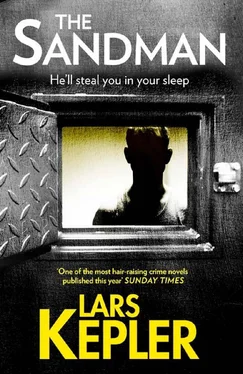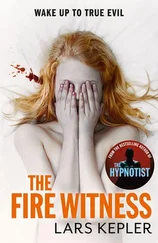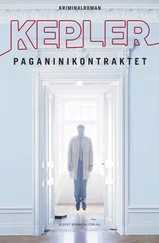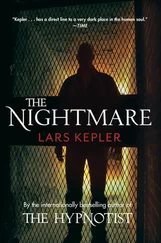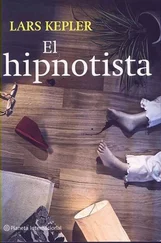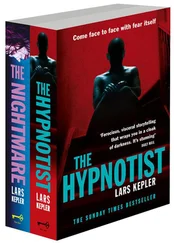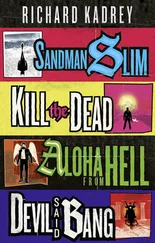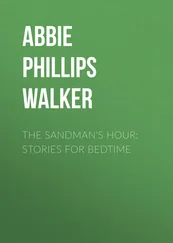Corinne closes her eyes and massages her neck. Pollock looks at her, trying to suppress the urge to offer to help. He’d be more than happy to stand behind her, gently softening up the muscles in her back.
‘I’ve got warm hands,’ Pollock says just as Joona Linna comes in.
‘Can I feel?’ he asks in his deep Finnish accent.
‘Kazakhstan aren’t making things easy for us,’ Corinne tells him. ‘But I—’
‘Jurek Walter comes from Russia,’ Joona says, taking a handful of sweets from a bowl.
‘Russia,’ she repeats blankly.
‘He speaks perfect Russian.’
‘Would Dmitry Urgov have lied to me...? Sorry, but I know him, and I really don’t believe that...’
‘He probably doesn’t know anything,’ Joona says, putting the sweets in his pocket. ‘Jurek Walter’s so old that it must have been in the days of the KGB.’
Pollock, Joona and Corinne are leaning over the table, summarising the situation. Not long ago they didn’t have anything. Now, thanks to Saga’s infiltration, they have a location. Jurek Walter let slip something when he whispered ‘Leninsk’. He grew up in Kazakhstan, but because Susanne Hjälm heard him talking educated Russian, it seems highly likely that his family came from Russia.
‘But the security police there didn’t know anything,’ Corinne repeats.
Joona takes out his phone and starts looking for a contact he hasn’t called for years. He can feel himself getting excited as he realises he might finally be on the trail of the mystery of Jurek Walter.
‘What are you doing?’ Corinne asks.
‘I’m going to talk to an old acquaintance.’
‘You’re calling Nikita Karpin!’ Pollock exclaims. ‘Aren’t you?’
Joona moves away, holding the mobile to his ear. The phone rings with a hissing echo, and a fair while later there’s a crackle.
‘Didn’t I thank you for your help with Pichushkin?’ Karpin asks abruptly.
‘Yes, you sent some little bars of soap—’
‘Isn’t that enough?’ he interrupts. ‘You’re the most persistent young man I ever met, so I might have guessed you’d phone and disturb me.’
‘We’re working on a very complex case here, which—’
‘I never talk on the phone,’ Nikita interrupts.
‘What if I organise an encrypted line?’
‘There’s nothing we couldn’t crack in twenty seconds,’ the Russian laughs. ‘But that’s beside the point... I’m out of it now, I can’t help you.’
‘But you must have contacts?’ Joona tries.
‘There’s no one left... and they don’t know anything about Leninsk, and if they did they wouldn’t say so.’
‘You already knew what I was going to ask,’ Joona sighs.
‘Of course. It’s a small country.’
‘Who should I talk to if I need an answer?’
‘Try the dear old FSB in a month or so... I’m sorry,’ Karpin yawns. ‘But I have to take Zean out for his walk, we usually go down the Klyazma, on the ice, as far as the bathing jetties.’
‘I see,’ Joona says.
He ends the call, and smiles at the old man’s exaggerated caution. The former KGB agent doesn’t seem to trust that Russia has changed. Maybe he’s got a point. Maybe the rest of the world has simply been tricked into thinking that things are moving in the right direction.
It wasn’t exactly a formal offer, but coming from Nikita Karpin it was almost a generous invitation.
Nikita’s old Samoyed dog Zean died when Joona was visiting eight years ago. He had been invited to give three lectures on the work that led to Jurek Walter’s capture. At the time the Moscow police were in the middle of the hunt for serial killer Alexander Pichushkin.
Nikita Karpin knows that Joona knows the dog is dead. And he knows that Joona knows where to find him if he goes for a walk on the ice on the Klyazma River.
It’s ten to seven in the evening, and Joona Linna is sitting on the last flight to Moscow. By the time the plane lands in Russia it’s gone midnight. The country is in the grip of a crisp chill, and the low temperature makes the snow quite dry.
Joona is being driven through the vast, monotonous suburbs in a taxi. It feels as though he’s caught in a loop of sprawling municipal housing estates when the city finally changes. He manages to catch a glimpse of one of Stalin’s seven sisters – the beautiful skyscrapers – before the taxi turns into a back street and stops outside the hotel.
His room is very basic and dimly lit. The ceiling is high, and the walls are yellow with cigarette smoke. On the desk is an electric brown plastic samovar. The fire-escape notice on the back of the door has a circular scorch-mark over the emergency exit.
As Joona stands at the only window looking down at the alley, he can feel the winter chill through the glass. He lies back on the rough brown bedspread, gazes up at the ceiling and can hear muffled voices laughing and talking in the next room. He thinks it’s too late to call Disa and say goodnight.
Thoughts are swirling through his mind, and their images carry him into sleep. A girl waiting for her mother to plait her hair, Saga Bauer looking at him with her head covered in cuts, and Disa lying in his bath humming with her eyes half-closed.
At half past five in the morning Joona’s mobile starts to vibrate on the bedside table. He slept in his clothes, with all the blankets and covers on top of him. The tip of his nose is frozen and he has to blow on his fingers before he can switch the alarm off.
Through the window the sky is still dark.
Joona goes down to the foyer and asks the young woman in reception to hire a car for him. He sits at one of the ornately laid tables, drinks tea and eats warm bread with melted butter and thick slices of cheese.
An hour later he is driving a brand-new BMW X3 on the M2 motorway out of Moscow. Shiny black tarmac rushes under the car. There’s heavy traffic through Vidnoye and it’s already eight o’clock when he leaves the motorway and turns off onto winding, white roads.
The trunks of the birch trees look like skinny young angels in the snow-covered landscape. Russia is so beautiful, it’s almost frightening.
It’s cold and clear, and Ljubimovka is bathed in wintery sunshine when Joona turns off and pulls up in a cleared yard in front of the house. He was once told the place used to be Russian theatre legend Stanislavsky’s summer residence.
Nikita Karpin comes out onto the veranda.
‘You remembered my grubby old dog,’ he smiles, shaking hands with Joona.
Nikita Karpin is a short, stout man with an attractively aged face, a steely gaze and a military haircut. When he was an agent, he was a frightening man.
Nikita Karpin is no longer formally a member of the security services, but he’s still employed by the Ministry of Justice. Joona knows that if anyone can find out whether Jurek Walter has any connection to Russia, it’s Karpin.
‘We share an interest in serial killers,’ Nikita says, showing Joona in. ‘For my part, they can be seen as empty wells that can filled with unsolved crimes... which of course is very practical. But on the other hand we have to arrest them so as not to appear incompetent, which makes the whole business much more complicated...’
Joona follows Karpin into a large, beautiful room whose interior seems to have remained untouched since the turn of the last century.
The old medallion wallpaper shimmers like thick cream. A framed portrait of Stanislavsky hangs above a black grand piano.
The agent pours a drink from a misty glass jug. On the table is a grey cardboard box.
‘Elderflower cordial,’ he says, patting his liver.
As Joona takes the glass and they sit down facing each other, Nikita’s face changes. His friendly smile vanishes as though it had never existed.
Читать дальше
Конец ознакомительного отрывка
Купить книгу
